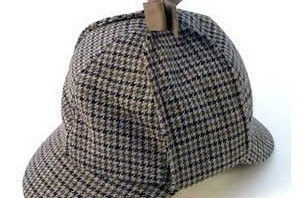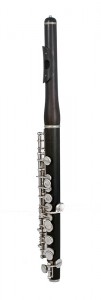 Whenever we get an older second hand instrument for sale, we research its history and background for its story. Sometimes the maker is obscure and there isn’t much information around, but occasionally a fascinating story is revealed. Often more than a little detective work is required to find an instrument’s story.
Whenever we get an older second hand instrument for sale, we research its history and background for its story. Sometimes the maker is obscure and there isn’t much information around, but occasionally a fascinating story is revealed. Often more than a little detective work is required to find an instrument’s story.
This was recently brought to mind, when we had two Adler piccolos for sale. One was marked Oscar Adler & Co while the other was stamped up F. O. Adler.
The first piccolo I was researching was the Oscar Adler. As a maker, Oscar Adler is well-known in woodwind circles: born in 1862, he produced woodwind instruments in the late 19th and early 20th centuries in Markneukirchen, Saxony. He held numerous patents: along with a chap named Hermann Jordan, he held in 1903 a patent for an instrument called the Oktavin (page in French), which was a hybrid of a clarinet, oboe and bassoon! By 1902 Adler was the largest woodwind manufacturer in Germany, and the Adler company continues today, concentrating nowadays on oboes and bassoons.
This piccolo was stamped with the Adler roundel with a serial number on the reverse and year of manufacture – 1936 – on the front. The year of the Berlin Olympics in Hitler’s Germany, and the year that Germany reoccupied the Rhineland.
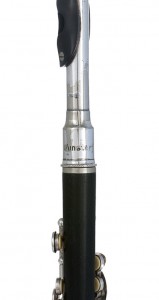 Aside from the maker’s stamp on the piccolo body, the headjoint had another mark: Fl. H K Wunstorf. I had no idea what this was: whether it was the name of a previous owner or even if it was another maker’s name. In this case, might the headjoint not be original?
Aside from the maker’s stamp on the piccolo body, the headjoint had another mark: Fl. H K Wunstorf. I had no idea what this was: whether it was the name of a previous owner or even if it was another maker’s name. In this case, might the headjoint not be original?
A quick search and it was revealed to me that Wunstorf was (and still is) a German air base in Lower Saxony, not too far from where Adler’s workshop was in Markneukirchen. This air base was built in… 1936!
The Fl. H. K. abbreviation stands for – I believe – Fliegerhorstkommadantur, or Air Field Station Command. So, it seems that this piccolo was purchased by the Luftwaffe specifically for their new airbase and was played by the band of the Luftwaffe! One can only speculate on the rallies that this instrument may have been played at.
This was fascinating to me: what this seemingly innocuous piccolo has seen in its life and the journey it must have made to end up for sale in a music shop in London. The RAF took over the German air base at the end of the war, so presumably this is when the piccolo came in to British hands.
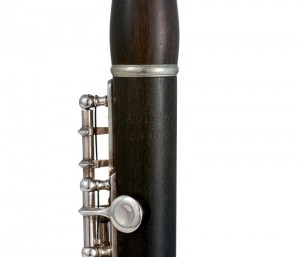
The second piccolo, which was marked as F. O. Adler, was the first instrument I had seen from this maker. Since I had no information on who this maker was, I turned to the trusty Langwill Index, which is a bible in these situations. It lists thousands of wind instrument makers from the infamous to the obscure: sometimes there is a lot of information, often there is just a scrap, or occasionally there is none at all.
Adler is a fairly common surname in Germany (it means ‘eagle’ – hence the wings sometimes found on a headjoint are called Adler wings, or eagle wings – nothing to do with an inventor), and there are several Adlers listed in Langwill: there are the three Adlers of Oscar’s family tree (his father Johann and brother Robert Oswald who were both also woodwind makers); Adler a brass instrument manufacturer; Eduard Adler a stringed-instrument maker; Frederic Adler of Paris, a bassoon technician and inventor; and Johannes Adler (of Markneukirchen, the same town as Oscar), who started making woodwinds, before branching into brass and strings. But, no mention of an F. O. Adler.
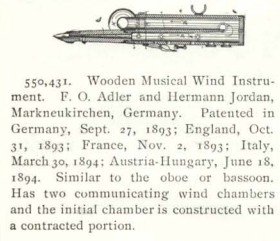
I then came across this article in the Patents section of Music Trade Review dating from 1896, which mentions an 1893 patent owned by F. O. Adler and Hermann Jordan, both of Markneukirchen. The text of the patent and accompanying picture shows the Oktavin! Putting two and two together, it turns out that the two Adlers were one and the same, that the initials F. O. stood for Franz Oscar, and that at some point between 1896 and 1903 he dropped the name Franz from the company name. This piccolo was certainly made before 1903 then, but beyond that it is hard to pinpoint a date.
As an aside, during my search through Langwill for F. O. Adler, I discovered one more interesting little snippet that reminds us of conditions in 1930s Germany. Here is part of Johannes Adler‘s entry in Langwill:
“A mid 1930s advertisement stated ‘note the forename – a purely Aryan business!’, an anti-Semitic reference to their local competitor O Adler.”
Perhaps Johannes Adler was envious that his Jewish competitor’s instruments, and not his own, had been purchased by the Luftwaffe. Maybe business was just slow, but either way I thought this was an interesting twist in the tale of these piccolos.

